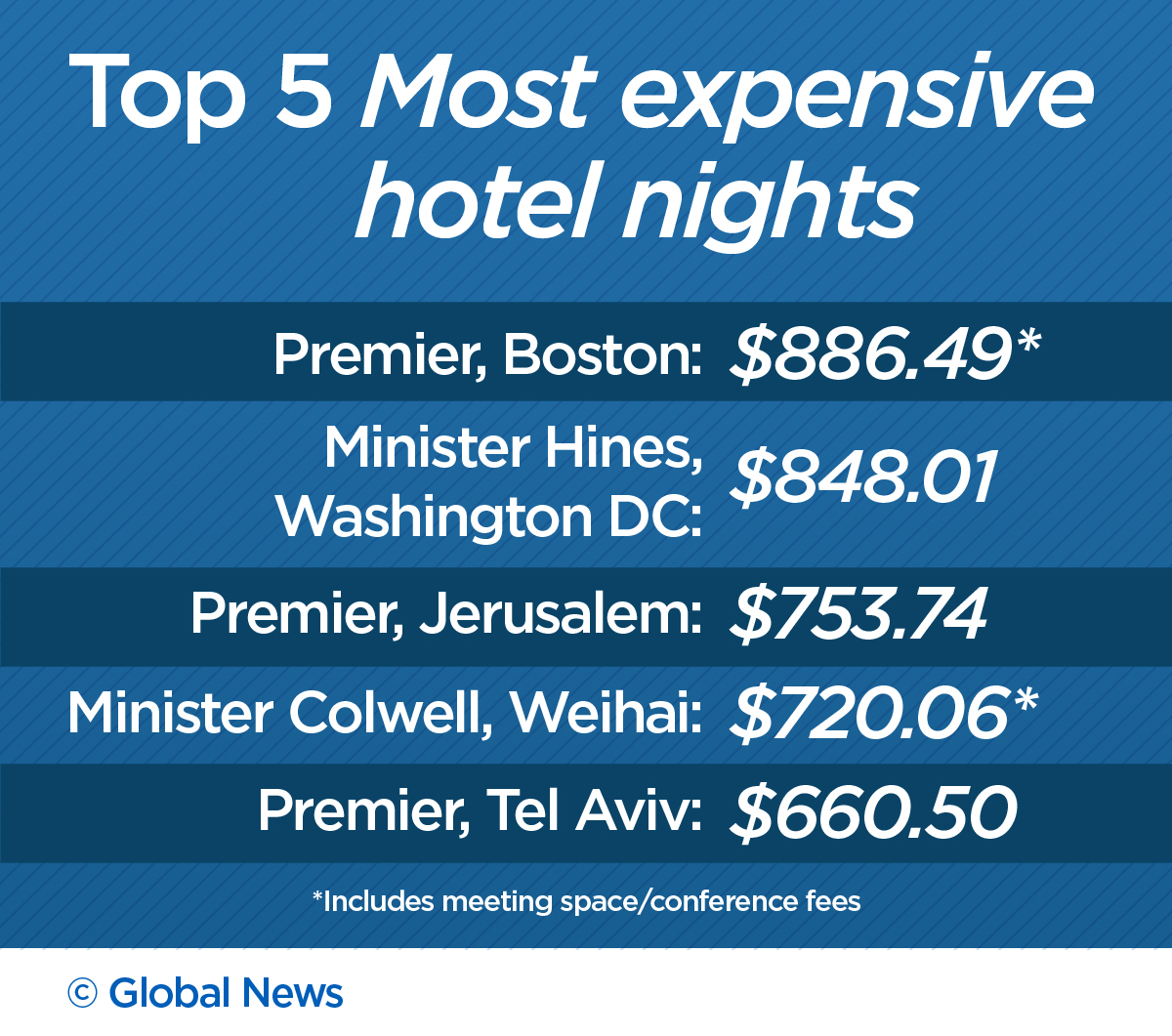Nova Scotia’s premier spent more days outside the country than in the legislature between January 2018 and September 2019, a Global News analysis has found.

The premier and 12 cabinet ministers have expensed more than $204,000 in international travel in that 19-month period, spending a collective 268 days in 17 countries.
Those costs do not include the travel expenses of the entire delegation, only the individual minister on each trip. The total costs aren’t reported publicly.
The biggest spender is Premier Stephen McNeil, who expensed $64,055.42 on nine trips and spent 76 days travelling internationally on behalf of the province. Keith Colwell, minister of agriculture and aquaculture and fisheries, is close behind with eight trips that took him out of the country for 74 days.
During the same time frame, MLAs were in the legislature for 74 days during four sittings.
“We’re out looking for opportunities and markets to grow our province,” said McNeil. “We see building relationships with other marketplaces as a key role of me as a premier, and cabinet ministers.”
The NDP leader agrees travel is part of the premier’s job, but says the amount of time and money spent suggests the government’s priorities are not where they should be.
- Canadians involved in tourist bus crash in Dominican Republic, embassy says
- Canadians stuck in Middle East say cities ‘very tense’ as Iran conflict escalates
- Alberta mulls ditching time switch — again — as B.C. moves to permanent daylight
- In London, Poilievre pitches new UK, Australia, New Zealand partnership
“At a time when we have so many people that actually can’t afford or find a place to live, or can’t get access to a mental health appointment, or can’t find a place in a nursing home, I would expect that the government’s focus and priority would be on the space between Meat Cove and Yarmouth,” Gary Burrill said.
As part of our analysis, Global News also looked at cabinet travel in Saskatchewan, a similar-sized province that has had the same government since January 2018.
Premier Scott Moe’s cabinet has spent 102 days outside the country in the same time period. The total costs, including all staff and ministers on each trip, amount to more than $418,500.
In order to compare to Nova Scotia, that has been divided by the number of participants to get a per-person cost of just over $95,600.
Saskatchewan has an international trade office in Shanghai, and recently announced it will open new trade offices in India, Singapore, and Japan as a way to increase exports.

It also recently announced a growth plan that includes more international trade missions. Nova Scotia has no international trade offices.
Travel to China
Nova Scotia’s premier was in China three times during the time frame analyzed. His most recent mission to Asia is not captured in the data, which is publicly available online.
McNeil says trips to China are essential to promoting the province’s exports. He’s travelled there eight times since taking office, and the province has developed a China Strategy.

Get daily National news
“In Asia, for example, meetings don’t happen without the premier and minister of fisheries showing up. The reality of it is, that’s fact,” McNeil said.
“And what we do know is when other premiers didn’t do it, our economy was failing.”
Nova Scotia’s total exports to China were $792 million in 2018, up from $197 million in 2013, according to the province. The premier says they will exceed $1 billion this year.
But the government does not seem to have specific data to quantify the link between government travel and exports.
“You want to quantify it? Ask Louisbourg Seafood what it has meant for them to have the minister of fisheries with them, what has it meant for them to be able to grow,” McNeil said.

Dalhousie University business professor Dan Shaw says it would be difficult to put a dollar figure on the amount of influence provincial government is having. He points out government officials in China have a great deal of influence over the economy.
“So building these strategic relationships at a regional, provincial, national level in China can drive things to a much greater extent than it would be if we were dealing with government partners in the U.S., or Australia or the U.K.,” he said.
But he says one of the biggest factors in the rising demand for Canadian lobster in China is growing wealth.
“Massively increased wealth in China is driving all kinds of different luxury. Basically the Chinese market is moving the world’s luxury products,” Shaw said.
The province’s fisheries and aquaculture minister says government travel is the biggest factor.
“It’s all about that. Because before we started, there was no market in China for lobsters. There was none,” Colwell said.
“The primary reason why we are in the strong position — let’s say, for example, in lobster exports — is not the travelling itinerary of the minister of fisheries or of the premier,” said Burrill.
“It is the international market and the quality of our product. So I think that it’s important to keep these things in perspective.”
Colwell’s $53,534.43 in personal travel costs only includes one trip to China in the fall of 2018. His other seven trips include two visits to the Seafood Expo North America in Boston, an agricultural mission to The Netherlands, and a trade mission in Norway.
His February 2019 mission to Singapore, Tasmania, and Japan cost taxpayers more than $108,000, including staff travel and $5,000 the province paid to 13 industry representatives on that trip.
Colwell says he would “rather be home, because this travel is no fun.”
“We’re not staying in real fancy places or anything like that. We usually have to stay where it’s closest we can to keep our costs down on travel,” Colwell said.
Colwell expensed 12 nights in hotels that cost more than $500 per night in Belgium, Singapore, Tasmania and China. Overall, cabinet ministers spent 38 nights in rooms that cost more than $500.
Middle East mission
In June 2019, the premier and two cabinet ministers travelled to the Middle East. It was billed in a news release as a way to “promote business relationships, trade and investment for Nova Scotia.”
The total cost of the trip was more than $78,500 for ministers and provincial staff.
Immigration Minister Lena Metlege Diab expensed $9,558.00 travelling to Lebanon from June 2 to 9. Internal Services Minister Patricia Arab expensed $6,678.49 for five days, although her travel was June 2 to 12. A spokesperson for Communications Nova Scotia says Arab stayed with family in Lebanon for the rest of her trip.
The premier spent June 2 to 8 in Lebanon, before travelling to Israel until June 15. He expensed $13,282.46.
According to the premier’s itinerary, the group took no formal meetings in Lebanon until June 7. After two days of travel, the Nova Scotia delegation visited various museums, castles, and historic sites for the better part of three days. They attended a dinner reception June 5, where the premier and Halifax developer Wadih Fares received awards.
On June 6, the premier gave “informal speaking bullets” at a tour of the Diaspora Village before the group attended a business reception with the Lebanese-Canada Business Association in the evening.
McNeil says he is the “only non-Lebanese person to ever speak to that Diaspora,” and the group was supporting Lebanese culture.
“One of the things that became very obvious to me in communities, culture matters. A connection for us matters, in terms of culture,” he said.
“The Lebanese culture is unique. We celebrate it here. We’re one of the few jurisdictions where the Lebanese have gone globally where they’ve kept their culture.”
The delegation spent its first day in Israel touring the Old City of Jerusalem and visiting a museum, according to the itinerary. The premier took several meetings with university officials, foreign affairs ministers, and other local officials during the rest of the trip.
On June 11, the premier’s delegation turned its attention to Palestine, meeting with the governor of Ramallah, the governor of the Palestinian Monetary Authority, and the executive director of the Palestinian Liberation Organization, Hanan Ashrawi.
According to the federal government’s official policy, “Canada also recognizes the Palestine Liberation Organization as the principal representative of the Palestinian people.”
Ashrawi received an honourary doctorate from Saint Mary’s University in 2000.
“We met with her, basically, for political reasons,” McNeil said.
“We’re in a very charged political environment, globally, and it would have been inappropriate for the Province of Nova Scotia to go in and meet with one aspect of that politically charged environment.”
PC Leader Tim Houston was asked for an interview and declined to comment on this story. In a brief conversation, he said the PCs plan to travel as a cabinet, too.










Comments
Want to discuss? Please read our Commenting Policy first.